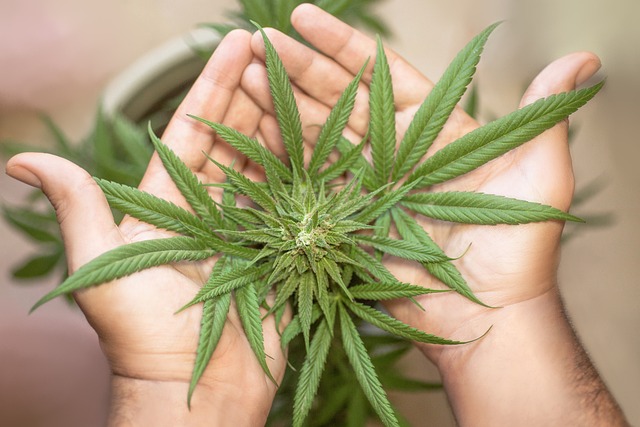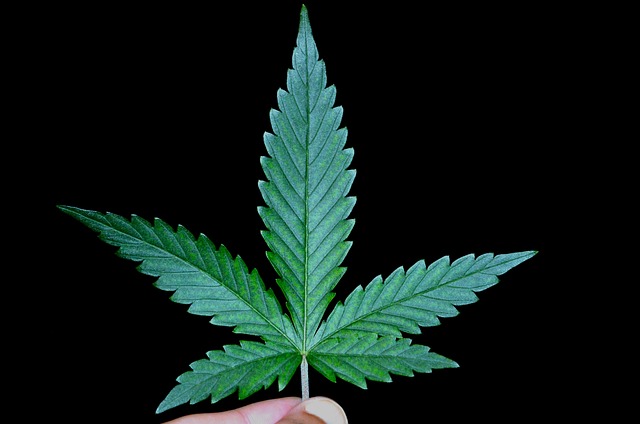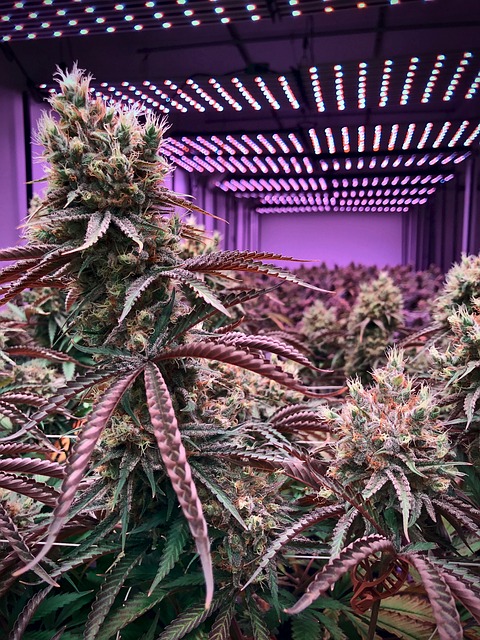THCA (Tetrahydrocannabinolic Acid), a non-psychoactive cannabinoid with potential therapeutic benefits such as anti-inflammatory and anti-nausea effects, has become legally available in New Hampshire. It's derived from hemp and must contain less than 0.3% THC to comply with state and federal laws. New Hampshire's legalization of THCA flower has expanded the cannabis market, offering consumers a range of products including flowers, edibles, and topicals, all available in local dispensaries. The rise in popularity of THCA is due to its therapeutic potential and the fact that it does not produce psychoactive effects like its counterpart, THC. Research is ongoing to further understand its benefits within the state's regulated cannabis landscape. Consumers are encouraged to purchase from credible sources to ensure product safety and efficacy. It's important for users to be aware of potential side effects such as dry mouth and red eyes, and to start with a low dose to assess personal tolerance. Always consult a healthcare provider if there are any concerns or pre-existing health conditions. The legal status of THCA in New Hampshire highlights the state's commitment to providing diverse cannabinoid options within a regulated framework.
Exploring the emerging landscape of cannabis products, this article delves into the therapeutic and potential side effects of THCA flower, now legally accessible in New Hampshire. As a precursor to THC, THCA has garnered attention for its distinctive composition and effects. We will navigate the legal framework surrounding its use, understand its benefits, and address concerns about its side effects. From dosage and safety to the entourage effect, this comprehensive guide offers insights into how individual factors influence one’s experience with THCA flower. As New Hampshire continues to shape its cannabis policies, staying informed on the implications of THCA flower consumption is crucial for both medical and recreational users. Join us as we explore the nuances of THCA flower and its place within New Hampshire’s legal cannabis market.
- THCA Flower and Its Emergence in New Hampshire's Legal Cannabis Market
- Understanding THCA: The Precursor to THC and Its Potential Benefits
- THCA Flower: Composition, Effects, and Methods of Consumption
- Legal Landscape: THCA Flower in the Context of New Hampshire Laws
- Potential Side Effects of THCA Flower: What Users Should Be Aware Of
THCA Flower and Its Emergence in New Hampshire's Legal Cannabis Market

The emergence of THCA flower, or tetrahydrocannabinolic acid, in New Hampshire’s legal cannabis market represents a significant milestone for consumers and industry stakeholders alike. THCA is the raw, non-psychoactive form of THC found in raw cannabis plants, which, upon heating, converts into THC, the primary psychoactive component of cannabis. As New Hampshire’s regulatory framework evolves to accommodate this burgeoning segment, THCA flower has become a topic of growing interest due to its potential therapeutic benefits and unique effects. The legal status of THCA in New Hampshire is clear; it aligns with the state’s broader cannabis legislation, allowing for the sale and use of this form of cannabinoid within the confines of the law. Consumers are increasingly exploring THCA flower for its reported anti-inflammatory properties and as an alternative to traditional THC products. This interest has led to a surge in availability, with local dispensaries stocking a variety of THCA strains to cater to a diverse range of consumer preferences and needs. As the market adapts to this new offering, it’s anticipated that further research will shed light on the full spectrum of benefits associated with THCA flower, potentially expanding its use and acceptance within New Hampshire’s regulated cannabis industry.
Understanding THCA: The Precursor to THC and Its Potential Benefits

Delta-9-tetrahydrocannabinolic acid, commonly known as THCA, is a natural cannabinoid found in the Cannabis sativa plant and serves as the precursor to the well-known psychoactive compound THC. As researchers continue to explore its properties, potential therapeutic benefits are emerging, which may include anti-inflammatory, neuroprotective, and anti-nausea effects. These benefits have sparked considerable interest in the scientific community and among medical professionals considering cannabinoids as part of treatment protocols. In New Hampshire, where legal status varies depending on the specific form of cannabis and its intended use, THCA has garnered attention for its therapeutic potential that is distinct from the psychoactive effects typically associated with THC. The legal landscape in New Hampshire allows for the exploration and utilization of THCA within the bounds of state regulations, offering a promising avenue for both research and medicinal applications. As such, the understanding and utilization of THCA are becoming increasingly relevant in the broader context of cannabis science and healthcare practices.
THCA Flower: Composition, Effects, and Methods of Consumption

THCA, or Tetrahydrocannabinolic Acid, is a naturally occurring compound found in the cannabis plant that has garnered attention for its potential therapeutic properties. Unlike its more famous counterpart, THC (Tetrahydrocannabinol), THCA is non-psychoactive, meaning it does not induce the “high” commonly associated with cannabis consumption. Instead, it is being studied for its anti-inflammatory, anti-nausea, and appetite-stimulating effects. The legal landscape surrounding THCA flower varies by jurisdiction; in New Hampshire, it falls under the state’s hemp program regulations, provided it contains less than 0.3% THC on a dry weight basis, making it a legal substance for consumption.
Consumption methods for THCA flower are diverse and cater to different preferences. One can utilize traditional smoking devices like pipes or bongs, vaporizers that allow for heat activation without combustion, or even prepare edibles by decarboxylating the THCA to convert it into THC. Topical applications are also popular for localized relief due to its anti-inflammatory properties. In New Hampshire, where THCA is legal, users have access to a range of products that capitalize on this non-psychoactive cannabinoid. It’s important for consumers to source their THCA flowers from reputable vendors to ensure safety and quality, as the market can be inconsistent. With the increasing availability of THCA-rich hemp products, users in New Hampshire have a new frontier of potential wellness solutions at their fingertips.
Legal Landscape: THCA Flower in the Context of New Hampshire Laws

In the context of New Hampshire’s evolving legal landscape, the status of THCA flower has been subject to nuanced interpretation. As per the state’s laws, products containing tetrahydrocannabinolic acid (THCA), a non-psychoactive cannabinoid found in hemp and cannabis plants, are legally permissible under certain conditions. The 2019 Farm Bill federally legalized hemp derivatives, which include THCA, provided they contain less than 0.3% delta-9-THC. New Hampshire aligns with this federal stance, allowing the sale and possession of THCA flower, so long as it adheres to these regulations. However, it is important for consumers to be aware that state laws may vary from federal guidelines, and New Hampshire’s approach is tailored to ensure compliance within its jurisdiction. Retailers in New Hampshire must navigate this legal terrain carefully, ensuring their THCA products are sourced and labeled correctly to avoid any legal discrepancies. This careful alignment with the law underscores the need for clarity and compliance in the market, reflecting a balanced approach to the use and regulation of THCA-rich products within the state’s boundaries.
Potential Side Effects of THCA Flower: What Users Should Be Aware Of

users considering the use of THCA flower, particularly in areas where it is legal such as New Hampshire, should be well-informed about its potential side effects. THCA, or Tetrahydrocannabinolic acid, is a non-psychoactive compound found in cannabis and hemp plants that is believed to possess various therapeutic benefits. However, like all substances, it can elicit certain reactions in individuals. Common side effects may include dry mouth and red eyes, which are typically mild and short-lived. More pronounced side effects, though less common, can include anxiety or paranoia, particularly at higher doses, and potential gastrointestinal issues like nausea or dizziness. It’s crucial for users to start with a low dose to gauge individual sensitivity and to consult with a healthcare provider if they have any pre-existing conditions or are taking other medications. The legality of THCA products varies by state, and in New Hampshire, it falls under the category of legal hemp products as per the 2018 Farm Bill and subsequent state legislation, provided they contain less than 0.3% THC. Users should always ensure that the product they are purchasing complies with these regulations to avoid any legal implications or negative health effects associated with higher concentrations of THC.
In recent times, the legal cannabis landscape in New Hampshire has seen the emergence of THCA flower, a natural precursor to THC that holds potential therapeutic benefits. As explored in this article, understanding THCA’s composition and effects, as well as its consumption methods, is pivotal for users within the legal framework established by New Hampshire laws. While the discussion around its medicinal properties is promising, it is equally important to be aware of the potential side effects associated with THCA flower use. Users should approach its consumption with caution, considering individual sensitivities and adhering to recommended dosages. The legal status of THCA flower in New Hampshire provides a structured environment for safe exploration and responsible use, underscoring the need for continued research and education on this evolving topic within the cannabis realm.
